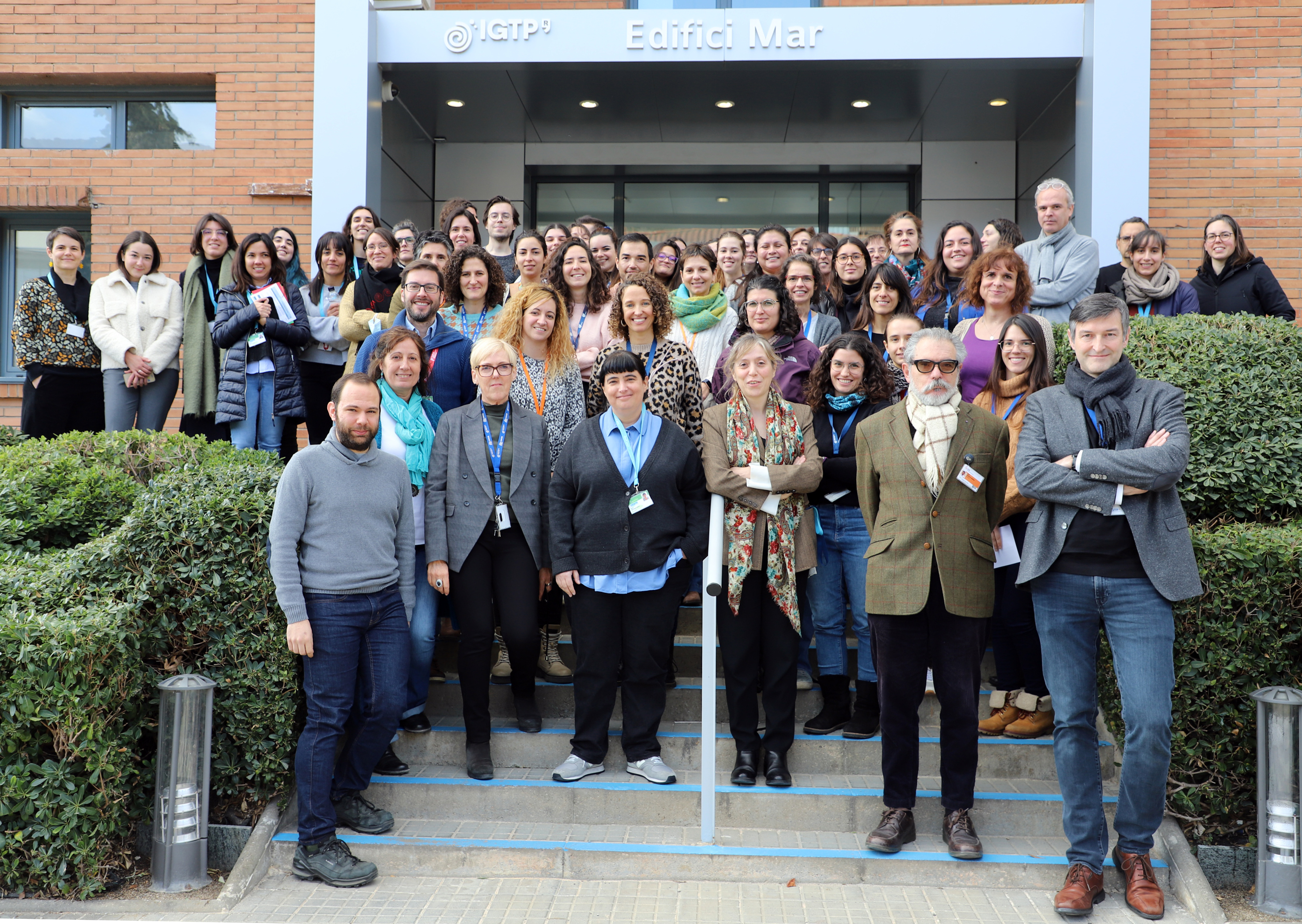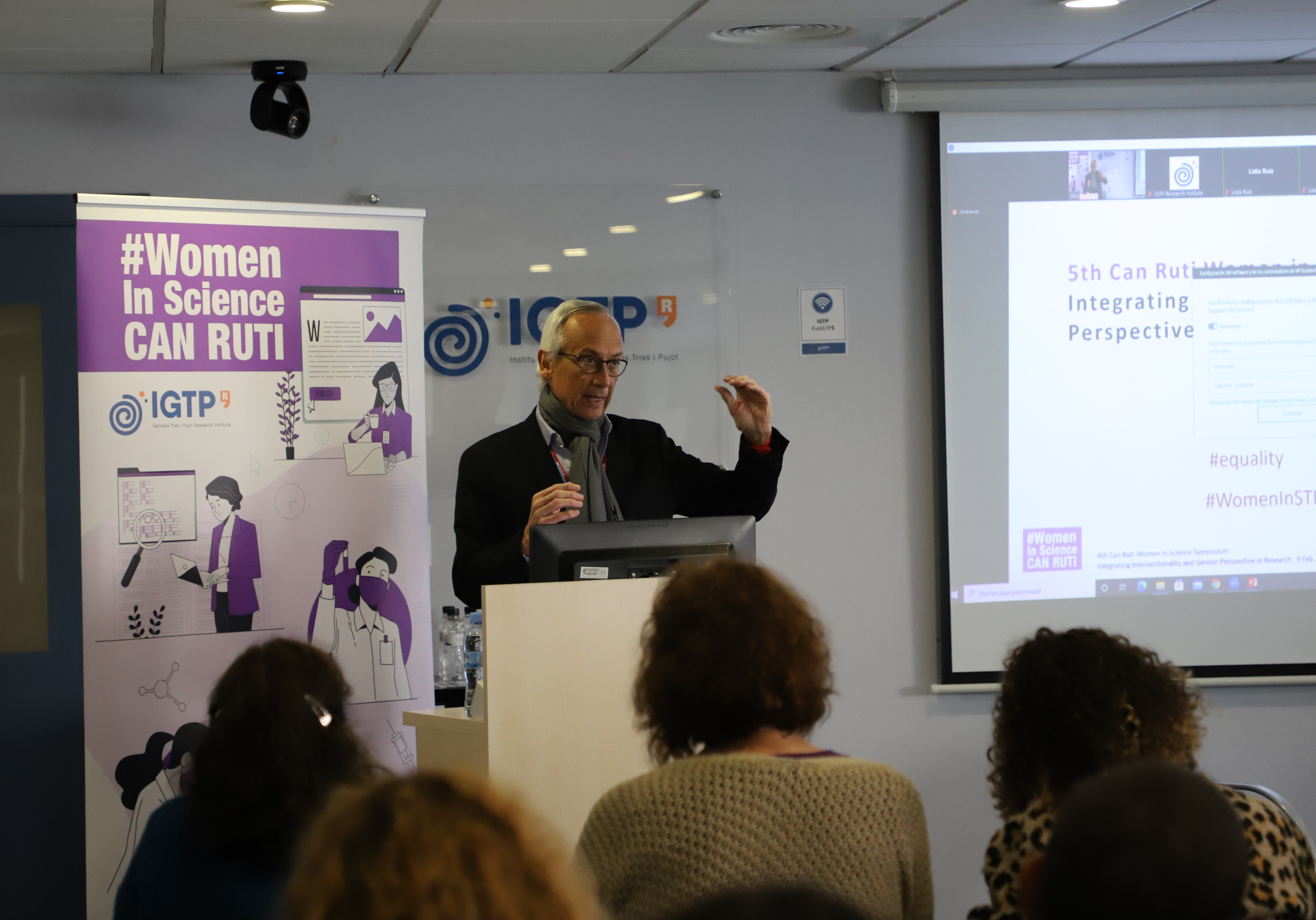The Can Ruti Working Group Women in Science (WiS) looks back on 5 years of activity and forward to the future of gender perspective and intersectionality in science

To celebrate the Day of Women and Girls in Science on 11 February the Can Ruti Working Group Women in Science (WiS) today held its 5th symposium focussed on Integrating Intersectionality and Gender Perspective in Research, hosted by the IGTP.
The meeting was opened by Dr Julia Garcia-Prado, Scientific Director at the IGTP, Group Leader at IrsiCaixa and Founder Member of WiS who highlighted the group's pride to be celebrating five years of activity. The General Director of the IGTP, Dr Jordi Barretina welcomed the over 100 people attending both at the IGTP and online and underlined the IGTP's commitment to equality for everybody and the thorough application of gender perspective at all levels of research at the institute. Julia Garcia-Prado gave an overview of Equality on Can Ruti Campus: Reflections on five years of Women in Science, including the different equality committees now active in all the institutions on the campus.
 Since six directors signed the 6-point Can Ruti Letter of Intent for Gender Equality based on the United Nations sustainable goals in 2019 there have been many initiatives and actions towards achieving better equality across the campus, although the work is far from finished. From the institutions who originally signed Dr Jordi Casabona, Director of the Centre for Epidemiological Studies of Sexually Transmitted Disease and AIDS in Catalonia (CEEISCAT) gave an account of the CEEISCAT's deep commitment to gender perspective and intersectionality, which is embedded in their research projects. Dr Bonaventura Clotet, Director of IrsiCaixa, Aids Research Institute and President of the Fight Aids Foundation, also affirmed IrsiCaixa's solid work on equality and how their Gender Equality Committee is now working on their second Gender Equality Plan. A new institute was welcomed to the celebration with Dr Montserrat Bernabeu, Co-Director, and Dr Josep Tormos, Research Coordinator, both of the Fundació Institut Guttmann. Dr Bernabeu explained how the institute has been revising its research strategy to ensure that the gender perspective is always maintained and how they are working on equality in organization and management.
Since six directors signed the 6-point Can Ruti Letter of Intent for Gender Equality based on the United Nations sustainable goals in 2019 there have been many initiatives and actions towards achieving better equality across the campus, although the work is far from finished. From the institutions who originally signed Dr Jordi Casabona, Director of the Centre for Epidemiological Studies of Sexually Transmitted Disease and AIDS in Catalonia (CEEISCAT) gave an account of the CEEISCAT's deep commitment to gender perspective and intersectionality, which is embedded in their research projects. Dr Bonaventura Clotet, Director of IrsiCaixa, Aids Research Institute and President of the Fight Aids Foundation, also affirmed IrsiCaixa's solid work on equality and how their Gender Equality Committee is now working on their second Gender Equality Plan. A new institute was welcomed to the celebration with Dr Montserrat Bernabeu, Co-Director, and Dr Josep Tormos, Research Coordinator, both of the Fundació Institut Guttmann. Dr Bernabeu explained how the institute has been revising its research strategy to ensure that the gender perspective is always maintained and how they are working on equality in organization and management.
 The keynote speaker, Dr Judith Juanhuix, Beamline Manager and Head of the Life Sciences Section at the ALBA Synchrotron reviewed some failures of science when tackling different aspects of gender. She warned about the risk of producing biased science and ultimately bad science if women are underrepresented in research. She also reviewed the status of women in science quantitatively, that is, the percentage of women in different fields, as well as qualitatively, that is, their presence in the different roles and hierarchy levels. Finally, she criticized the treatment that science has historically given to gender diversities, and displayed the severe contradictions and limitations of science when studying trans persons. The talk concluded that human rights are superior to scientific research and must be respected at all times.
The keynote speaker, Dr Judith Juanhuix, Beamline Manager and Head of the Life Sciences Section at the ALBA Synchrotron reviewed some failures of science when tackling different aspects of gender. She warned about the risk of producing biased science and ultimately bad science if women are underrepresented in research. She also reviewed the status of women in science quantitatively, that is, the percentage of women in different fields, as well as qualitatively, that is, their presence in the different roles and hierarchy levels. Finally, she criticized the treatment that science has historically given to gender diversities, and displayed the severe contradictions and limitations of science when studying trans persons. The talk concluded that human rights are superior to scientific research and must be respected at all times.
Yesika Díaz of the CEEISCAT presented the annual results of the WiS Observatory, which reports on the proportions of male and female speakers and organizers at events held on the campus. Results show that numbers have improved over the five years of the WiS Observatory; more women are being invited to speak and more organizers are taking on the observatory's advice when planning events. The ICO, B·ARGO and IGTP stood out for their excellent results.
Every edition the WiS has invited an influential man on the campus to present a relevant paper for the theme chosen. This year Dr Oriol Mitjà, Infectious Diseases Researcher at the Fight Infections Foundation, chose the paper Who is telling the story: a systematic review of authorship for infectious disease research conducted in Africa, 1980-2016. BMJ Global Health 2019. This paper denounces the continuation of white colonialism in health research in Africa. Not only do most papers on infectious diseases there have first authors from outside the country, but often data and sample are extracted without acknowledgment. He called for the commitment to building capacity in each country so they can strengthen their own research structure.
Dr Maite Solans, Researcher of the Health Science Area, AQuAS - Intersectionality /Gender and Impact outlined how to use the AQuAS Tool to incorporate Intersectionality as well as the perspective of sex and gender into research. She provided practical examples and advice on planning research projects with intersectional considerations. Then Dr Israel Fernández, of the Pharmacogenomics and Neurovascular Genetics Group at IIB Sant Pau presented research on whether stroke is strongly influenced by gender, tackling the topic from epigenetics to microbiome studies. He warned that there are differences in genetic risk factors depending on sex, which will be important for precision medicine of the future. National and global cohorts should include this type of data.
As usual, the round table was an active affair, with the public present in the room participating. They were asked a series of questions about the effects of gender, transgender and ethnicity on aspects of healthcare and scientific careers. The four members of the panel Drs Fernandez, Juanhuix, Mitjà and Solans added their own insights and comments during the lively and often provocative discussion that followed.
As is now traditional, the session closed with a short homage to an under-recognized female scientist. This year the WiS celebrated Lise Meitner, the Austrian physicist who first described nuclear fission in a letter to Nature in 1939, although her male colleague was awarded the Nobel Prize for Physics for the discovery in 1944.
Members of the WiS were very pleased with the success of the symposium and several members of the public expressed how much they had enjoyed the very relevant research and comment on a subject that is not often mentioned in our context. "The WiS started the conversation about gender equality on the campus when there was little institutional interest and that has changed today," said Julia García-Prado to close the event, "now we are starting the conversation on intersectionality and we fully believe we will see progress on this too," she added.
About Can Ruti Women in Science (WiS)
Can Ruti Women in Science is a working group born out of the desire to work towards promoting equality issues in research on the Can Ruti Campus, with a particular emphasis on equal opportunities for women and the gender dimension in research.
It is an independent inter-institutional group, which receives logistical and communications support from the Germans Trias i Pujol Research Institute (IGTP). Can Ruti Women in Science activities focus on two areas: Gender equality issues for the people working in research institutions on the campus and the inclusion of the gender dimension in biomedical research. Currently the WiS is focusing on inclusion of everybody in biomedical research, irrespective of gender, or any other characteristic.
Contact WiS on wiscanruti@gmail.com
The current members of the WiS are:
- Cristina Agustí, CEEISCAT-IGTP, ICO
- Ana Barajas, IrsiCaixa
- Yesika Díaz, CEEISCAT-IGTP, ICO
- Harvey Evans, IGTP
- Julia Garcia-Prado, IGTP Scientific Director, IrsiCaixa AIDS Research Institute
- Gabriela González, Fight Infections Foundation
- Nuria Izquierdo-Useros, IrsiCaixa AIDS Research Institute
- Marta Monguió Tortajada, IGTP-HUGTiP
- Sara Morón-López, IrsiCaixa
- Jose A Muñoz-Moreno, Fight Infections Foundation
- Cristina Peligero, IrsiCaixa
- Anna Pons, IrsiCaixa
- Pol Romano, CEEISCAT-IGTP, ICO
- Inés Velasco, HUGTiP, IGTP
Text corrected 10 February 2023
